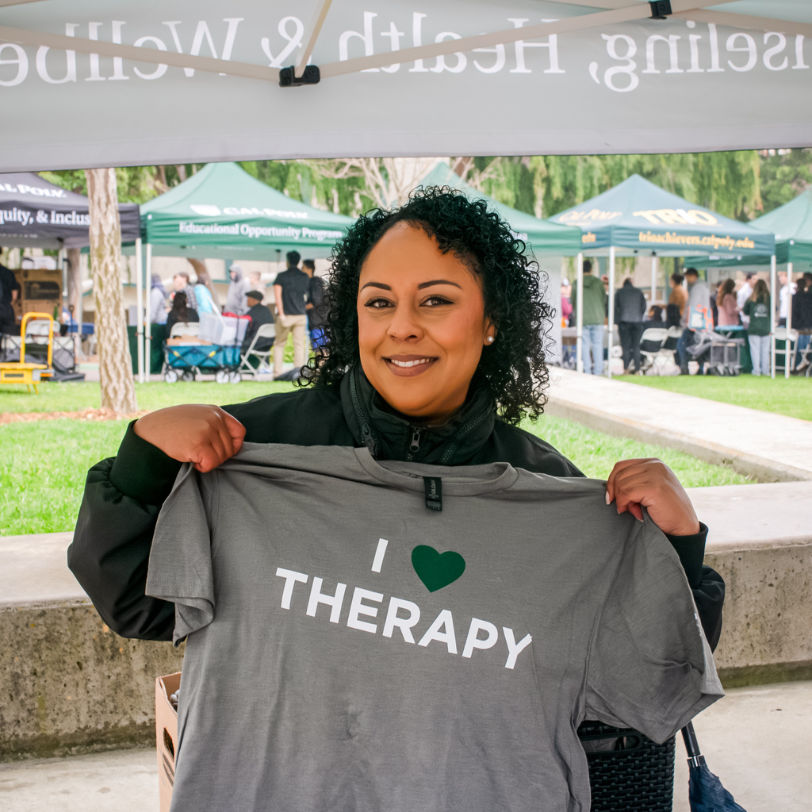What is Safer?
Safer is Cal Poly’s primary confidential resource for addressing sexual assault, intimate partner violence, domestic violence, stalking, sexual exploitation, and harassment.
Located within Campus Health and Wellbeing, Safer offers holistic services to the entire campus community regarding gender- & power-based violence. Our Advocacy Staff supports survivors of violence (and their loved ones) directly, by offering confidential crisis support and advocacy, which includes crisis intervention, accompaniments, referrals, and more. Our Prevention Education Staff engages the campus community in setting pro-social behavior norms and encouraging community accountability so this violence never occurs in the first place.
Read more about our services and history below.

Survivor Advocacy
Our full-time professional staff are California state-certified crisis counselors for sexual assault & domestic violence. We are available to our entire campus community: survivors and loved ones, and students, faculty & staff.
Our Advocates can provide the following services:
- 1:1 confidential crisis intervention and support
- Accompaniments to medical forensic exams, law enforcement interviews, Title IX proceedings, court, etc.
- Trauma-informed and survivor-centered information and validation regarding common feelings, experiences, and questions regarding reporting & healing processes
- Referrals for university accommodations & community support services
- Ongoing survivor support
Learn more & make an appointment here.

Prevention Education
We believe in a culture where violence is preventable. Our Prevention Education team is dedicated to engaging our community in violence primary prevention, through the following services:
- Trainings on gender- & power-based violence prevention & response
- Quarterly student-run events focused on education & prevention
- October is Domestic Violence Awareness Month
- January is Stalking Awareness Month
- April is Sexual Assault Awareness Month
- Check out our events calendar for more information!
- Safer Leadership Training offered every quarter
- Consultations for campus leaders (faculty, staff, club advisors, etc.) interested in seamlessly integrating prevention work into their programming
- Collaborations with campus partners
 History of Safer
History of Safer
- The Safer program was born in Fall 1996 and housed in Peer Health Education. It initially began as an acronym for "Sexual Assault Free Environment Resource" - S.A.F.E.R.
- On July 1st, 1999, S.A.F.E.R. moved from the Health Center to the Women’s Center to increase collaboration with Women’s Programs and Services.
- On February 14th, 2011, the Women’s Center changed its title to the Gender Equity Center and now housed Safer, Women’s Programs, and the new Men and Masculinity Programs.
- In the summer of 2011, Safer became a stand-alone program in Student Life and Leadership and in 2012 became a confidential resource for survivors and loved ones. The name was changed from the acronym Sexual Assault Free Environment Resource (S.A.F.E.R.) to a standalone word - Safer - and became a part of the Dean of Students department.
- In Fall 2018, Safer was reorganized within Wellbeing Services in Campus Health & Wellbeing, to align with national best practices of acknowledging gender- & power-based violence as a public health issue.
The Red Hand Print Campaign
The Red Hand Print campaign was present on Cal Poly’s campus until the mid-2000s. When a sexual assault was reported to Safer, a red handprint would be painted in that location on campus, with handprints appearing in front of buildings, dormitories, and other gathering places on campus. This was to signify how pervasive this issue was and is on campus.
While no red handprints can be found on the ground today at Cal Poly, memorials can be found in various locations around campus, including the University Union, residence halls, and near Campus Market.
Gone But Not Forgotten
Safer’s creation in 1996 was sparked by the loss of three local young women. While one of the cases remains open, these senseless losses of life catalyzed our community into action around safety and gender- & power-based violence.
| KRISTIN SMART | |
|---|---|
 |
|
| RACHEL NEWHOUSE | |
|---|---|
 |
|
| AUNDRIA CRAWFORD | |
|---|---|
 |
|




